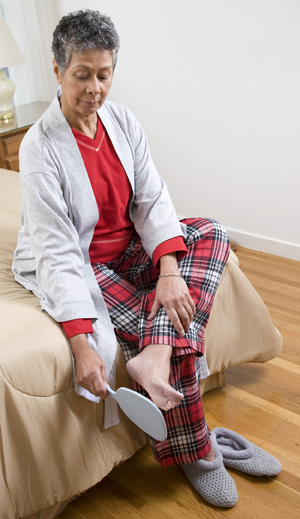Diabetes: Caring for Your Body
Diabetes: Caring for Your Body

When you have diabetes, your body needs special care. This care helps you stay healthy and prevent problems. Exercise and healthy eating are a part of this. You can also protect yourself by taking special care of your feet, skin, and teeth.
Caring for your feet
Follow these tips to help keep your feet healthy:
-
Check your feet every day for redness, blisters, cracks, dry skin, or numbness. Use a mirror to check the bottoms of your feet, if needed. Or ask for help.
-
Wash your feet in warm (not hot) water. Don’t soak them.
-
Use an emery board to keep your toenails even with the ends of your toes. File away sharp edges. A foot doctor (podiatrist) may need to cut your toenails for you.
-
Smooth down calluses gently or wait until you next podiatry appointment.
-
Keep your skin soft and smooth by putting a thin layer of skin lotion on the tops and bottoms of your feet. Don't put lotion in between your toes.
-
Always wear shoes or slippers, even inside your home. Make sure that shoes are correctly fitted. Change your socks daily. Always check shoes for foreign objects before putting them on.
-
Call your healthcare provider right away if your feet are numb or painful. Also call your provider if a cut or sore doesn’t heal in a few days.
Preventing skin infections
To prevent skin infections, bathe every day. Dry yourself well, especially between your toes. Wash any cuts with warm, soapy water. Cover with a sterile bandage. Call your healthcare provider if a cut or sore doesn't heal in a few days, feels warm, itches, is swollen, or has a bad smell.
Caring for your teeth
Follow these guidelines for healthy teeth:
-
Brush your teeth twice daily.
-
Floss your teeth daily.
-
See your dentist at least twice yearly.
-
Keep your blood sugar in a good range.
If you smoke, quit
Smoking is dangerous for everyone, especially people with diabetes. It can harm the blood vessels in your eyes, kidneys, nerves, and heart. It raises blood pressure. Smoking can also slow healing, so infections are more likely. Ask your healthcare provider about programs to help you stop smoking.
Updated:
August 20, 2019
Reviewed By:
Raymond Kent Turley BSN MSN RN ,Raymond Kent Turley BSN MSN RN ,Raymond Kent Turley BSN MSN RN